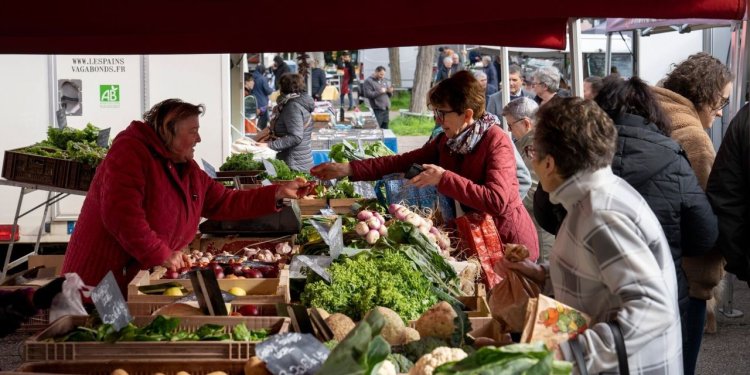Europe’s Economy Avoids Recession—Just About
Europe’s return to modest growth coincides with a pickup in China and a slowdown in the U.S. Photo: Nicolas Leblanc/Bloomberg News By Paul Hannon April 28, 2023 5:16 am ET Europe’s economy skirted a recession at the start of the year, underlining the continent’s surprising resilience despite Russia’s war on Ukraine, signs of banking strains, and repeated interest-rate increases to combat stubbornly high inflation. The bloc’s return to modest growth coincides with a first-quarter pickup in China and a slowdown in the U.S. Taken together, these numbers suggest the global economy likely bounced back from a trough late last year, although headwinds from a restrictive monetary policy could put a lid on the revival. The European Union’s statistics agency said the combined economic outp


Europe’s return to modest growth coincides with a pickup in China and a slowdown in the U.S.
Photo: Nicolas Leblanc/Bloomberg News
By
Europe’s economy skirted a recession at the start of the year, underlining the continent’s surprising resilience despite Russia’s war on Ukraine, signs of banking strains, and repeated interest-rate increases to combat stubbornly high inflation.
The bloc’s return to modest growth coincides with a first-quarter pickup in China and a slowdown in the U.S. Taken together, these numbers suggest the global economy likely bounced back from a trough late last year, although headwinds from a restrictive monetary policy could put a lid on the revival.
The European Union’s statistics agency said the combined economic output of the 20 eurozone countries rose at an annualized rate of 0.3% in the first three months of 2023, after shrinking by 0.2% in the final quarter of last year.
Back in November, the EU’s economists said they expected to see a recession in the bloc and most of its member states, as they assessed the cost of Russia’s throttling natural-gas supplies.
The stronger economic output is in part due to a drop in energy prices from their summer peaks, due to an unusually warm winter and an influx of liquefied-natural gas from the U.S. and elsewhere. This was reflected in a rise in imports from the U.S., which were up a fifth in the first two months of 2023 against a year earlier.
The pickup in activity isn’t necessarily good news for the European Central Bank. One consequence of Russia’s invasion of Ukraine is an inflation rate that was more than three times the bank’s 2% target in March. The stronger the eurozone economy, the longer it is likely to take to bring inflation down.
Separate data also released Friday pointed to a rise in annual rates of inflation in France and Spain in April. ECB policy makers have signaled they will raise their key interest rate again next week in a further effort to cool demand. Many economists still think this risks pushing the economy into a recession, if not this year, then next.
“The excessive focus on past inflation rates and the disregard of weak credit dynamics as well as tensions in certain areas of the financing business increase the risk that the ECB will go too far with its rate increases and slow down the economy excessively next year,” said David Kohl, Julius Baer’s chief economist.
Europe’s rebound has partly been driven by energy-intensive factories, which reduced output as energy prices surged, but have since reversed some of those cuts.
One of these companies is AG , a German steelmaker. It said it is getting energy costs under control and is now more upbeat about its prospects.
“It is good to see that energy has come down significantly after the peak that we have seen in 2022,” said Chief Executive Officer Gunnar Groebler. “We have adjusted our outlook for the year compared with November, where it has been much more gloomy.”
France’s statistics agency said factory output in the eurozone’s second-largest member grew at a strong pace, having contracted in the final quarter of last year. That turnaround helped the economy grow despite the disruptions caused by a wave of protests and strikes in opposition to President Emammuel Macron’s plan to extend the retirement age.
Spain’s economy picked up as tourism continued to revive, while Italy’s economy grew again after contracting at the end of last year. Germany’s economy stagnated, having shrunk by half a percentage point in the final quarter of 2022 according to revised official figures.
Business surveys indicate that the eurozone economy may speed up again in the three months through June as usage of still-expensive energy declines, leaving households with more to spend on other goods and services.
However, other headwinds are building, not least higher borrowing costs as the ECB tries to cool inflation. The ECB’s own data indicate that banks are cutting their lending to businesses and households, and recent stresses in the financial system may deepen those cuts.
Some ECB policy makers are nervous about pressing ahead with more rate rises without having seen the full impact of the moves to date. The raises have been large and rapid by historic standards, raising some concerns about the ability of the economy, including the banking sector, to adapt to such a rapid change in borrowing costs.
“Most of the economic impact of the rate increases implemented so far is likely to be felt in the coming months,” Bank of Italy Gov. Ignazio Visco said in a recent essay on inflation. “This may in itself suggest that a degree of prudence is necessary when determining the future path of monetary policy.”
It is also possible that the eurozone economy is less robust than it appears. Revisions to the growth data as more information becomes available may yet show that the eurozone economy experienced a recession over the past six months. In its first measure of activity in the final quarter of last year, Eurostat estimated the economy expanded at an annualized rate of 0.5%, but has since downgraded that to show a contraction.
—William Boston contributed to this article.
What's Your Reaction?

















